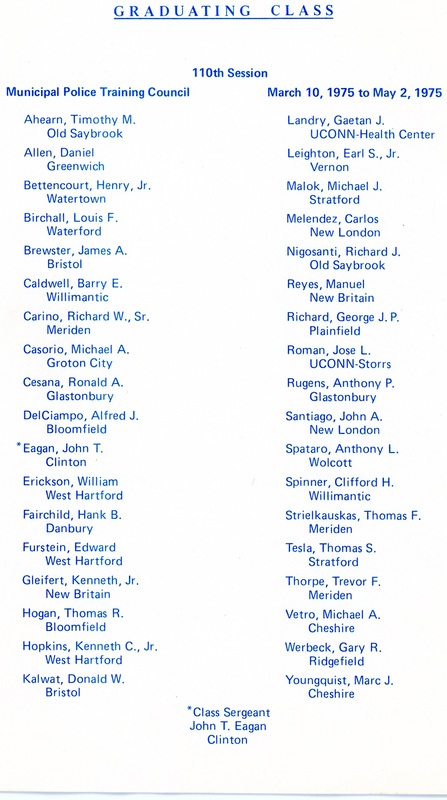Connecticut Policy Academy Graduating Class of 1975 Listing including Manuel (Manny) Reyes
Title
Subject
Puerto Ricans in mass media
Puerto Rican young men
Police
Police brutality
Police-community relations
Description
In the program of graduates from the Connecticut Police Academy in 1975, Manuel (Manny) Reye’s name is listed. Manny was the second Latino to serve in New Britain, but it was not an easy accomplishment. In 1974 he had passed all of his tests to be admitted, but was disqualified because of controversy surrounding his race. Manny’s acceptance into the New Britain Police Force in 1975 was momentous because it signified the racism against the Puerto Rican community, and reflected the inclusion that Puerto Ricans were trying to achieve.
Manny’s admittance into the police force was not an isolated experience; from 1969-1979 the Puerto Rican community in Hartford faced hostility followed by progression. In the article, “A Decade of Change: Puerto Rican Politics in Hartford, Connecticut, 1969-1979” Jose E. Cruz argued that the riots of 1969 set the stage for Puerto Rican political development in 1979. The riots that took place in 1969 were not in New Britain where Manny lived, but since New Britain is in the greater Hartford area, the events would have surely affected the Puerto Rican community in the surrounding areas. The riots started when a white motorcycle gang began harassing Puerto Rican individuals. When Puerto Ricans retaliated the police force was called in and they continued to arrest only Puerto Ricans. The press commented on the riots and blamed Puerto Ricans, which caused the riots to continue, with a week of looting and violence. Puerto Rican leaders within the community recognized that something needed to change. Primarily they realized that programs initiated to help the Puerto Rican community needed to be run by Puerto Ricans themselves. They didn’t just want programs; they wanted power to make a difference. Hartford’s political progression was similar to that of the Puerto Rican community in New York City as explained by historian Virginia E. Sanchez Korrol.
In the midst of the political development, Manny contributed to the inclusion. Instead of hoping that police brutality would get better, he worked to change it himself. In 1974 he was made a regular patrolman until controversy arose. Previously on May 11th there was suspected police brutality at a Puerto Rican club. Afterwards there was a demand for more Spanish-speaking policemen. When Manny was accepted the President of the Policeman’s union claimed that he had been selected over four other suitable individuals and called for his removal. This controversy eventually caused Manny to be disqualified until 1975 when he was finally admitted.
Manny’s experience was not the only one of its kind. In Hartford the fire department did not hire Spanish-speaking people until a young boy died, because the firefighters could not communicate with the civilians to learn that he was trapped. The inclusion of Puerto Ricans was crucial because the population of the community continued to rise. Not only was it important for them to be recognized politically, but also in services such as the police and fire department. They were no longer fighting for justice; they were fighting for inclusion.
The Puerto Rican community's push for inclusion broke stereotypes that had been engrained in American society. Cruz explained that the Hartford story of political development contradicted the stereotype of an apathetic community. According to Peter Jackson this stereotype was instilled in American’s from the start of their relationship with Puerto Rico. The early view was that Puerto Ricans could not govern themselves. Political discourse and social science research contributed to the ideal of a docile Puerto Rican. The press, who only portrayed negative connotations about the migrant group, emphasized the stereotypes. The leaders in Hartford as well as individuals like Manny, broke racist barriers and worked for the inclusion of Puerto Ricans in society.
Although there is more work to be done, Manny continues to redefine what it means to be Puerto Rican. In 2008 he was granted a Proclamation from the Mayor of New Britain stating all of the accomplishments he had made for the Puerto Rican community. In 2011 he joined the New Britain Police Force board and Chairman to the commission. Individuals such as Manny are crucial in understanding the history of Puerto Ricans in America.
Bercowitz, Milt. “Puerto Rican Named Policeman.” The Hartford Courant. Published on June 5, 1974.
Cruz, José E. "A Decade of Change: Puerto Rican Politics in Hartford, Connecticut, 1969-1979." Journal of American Ethnic History 16, no. 3 (1997): 45-80.
Jackson, Peter. “ ‘A Permanent Possession?’ US Attitudes Towards Puerto Rico.” In Race and Racism: Essays in Social Geography, edited by Peter Jackson, 253-270. London: Allen and Unwin, 1987.
Korrol, Virginia E. Sanchez. From Colonia to Community: The History of Puerto Ricans in New York City. Berkeley: University of California Press, 1983.
Stacom, Don. “Police Board Gets New Leader: New Britain.” The Hartford Courant, November 18, 2011.
Creator
Source
Publisher
Date
Accession Date: April 6, 2017
